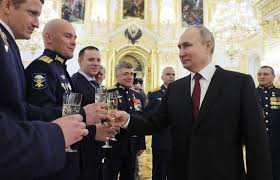The manpower crunch has gotten so bad that the Russian military is now offering sign-on bonuses and salaries that are so competitive that even the country’s lucrative oil and gas industry isn’t keeping up, Bloomberg reported on Monday.
Russia’s oil and gas sector has been paying wages that are at least two-thirds higher than the national average wage since 2017, per Bloomberg calculations based on official data.
That’s no longer the case.
In January and February, workers in Russia’s oil and gas sector took home about 125,200 rubles, or $1,370, in monthly nominal salary, per the media outlet.
But the Russian army is now offering incentives to contract soldiers, including a nationwide sign-on bonus of 195,000 rubles, according to a Russian government portal. Each region in the country also offers an additional one-time payment of up to 1 million rubles, per Bloomberg.
The salary of a contract soldier starts at 210,000 rubles per month.
That means people who enlist in the war receive sign-on bonuses and monthly wages greater than a month’s oil or gas sector salary.
The competition Russia’s military poses to its oil and gas sector is important because the country is a major energy producer, and the industry’s robust revenues have kept Moscow’s war chest filled. It also illustrates how Moscow’s war in Ukraine — now into its third year — is siphoning resources from the rest of the Russian economy.
Moscow-based Kasatkin Consulting, formerly Deloitte’s research center, estimates that Russia’s oil and gas industry faces a shortfall of 40,000 workers this year, according to Bloomberg.
“Staff shortages have affected even the wealthy industries,” Alexei Zakharov, the president of Superjob.ru, an online recruiter, told the media outlet. “The oil and gas sector can afford to attract employees with higher salaries, but the state competes by offering military contracts.”
Putin is urging Russians to have more babies
Russia’s manpower crunch isn’t solely due to wartime mobilization.
There was a massive brain drain after the war started — which has somewhat reversed — and a demographic crisis in the making before the conflict started.
Furthermore, the UK estimated last month that about 450,000 Russian military personnel have been killed or wounded since the war started in February 2022. This excludes those who have been killed while serving in private military companies.
Russia’s demographic crisis is so dire that Russian President Vladimir Putin has taken to encouraging women to have more babies for ethnic survival.
“If we want to survive as an ethnic group — well, or as ethnic groups inhabiting Russia — there must be at least two children,” Putin said at a tank factory in February.





